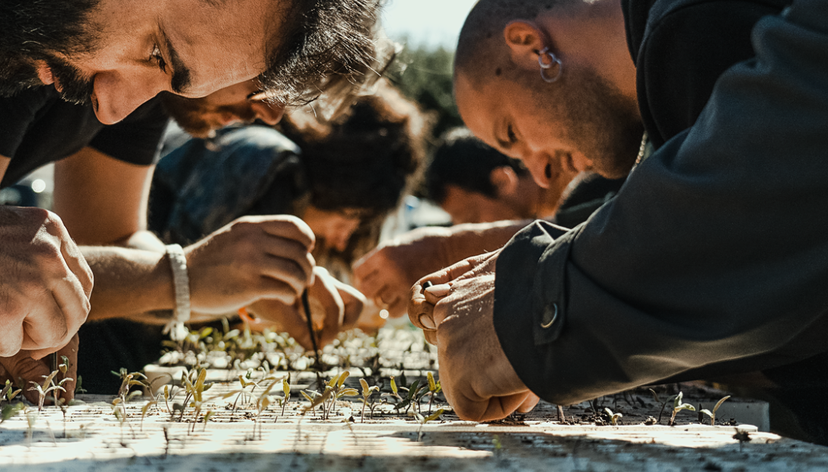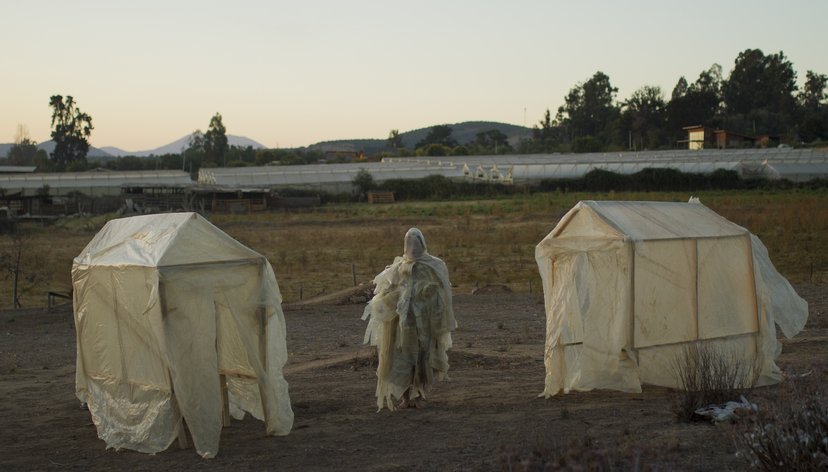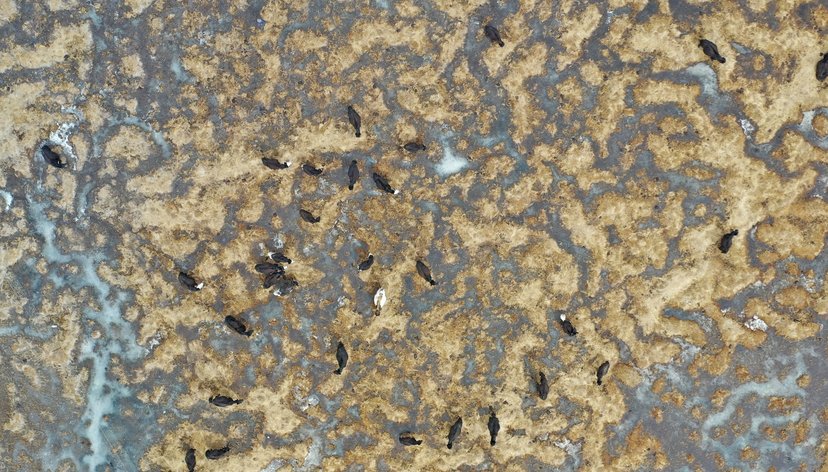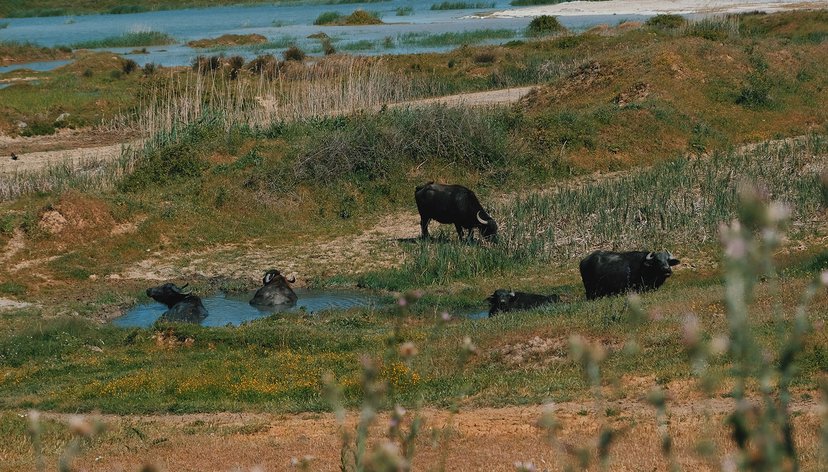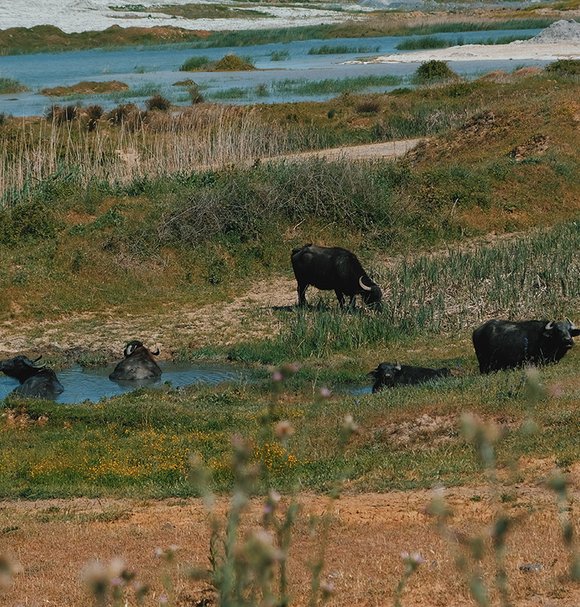
Key details
Date
- 28 March 2023
Author
- RCA
Read time
- 6 minutes
28 March 2023: The Royal College of Art (RCA), the world’s number one art and design university, and Community Jameel, announced today the launch of CLIMAVORE x Jameel at RCA, a new initiative led by Alon Schwabe and Daniel Fernández Pascual, Senior Research Fellows in the RCA School of Architecture and co-founders of the art and architectural practice Cooking Sections.
Key details
Date
- 28 March 2023
Author
- RCA
Read time
- 6 minutes
The Royal College of Art (RCA), the world’s number one art and design university, and Community Jameel, announced today the launch of CLIMAVORE x Jameel at RCA, a new initiative led by Alon Schwabe and Daniel Fernández Pascual, Senior Research Fellows in the RCA School of Architecture and co-founders of the art and architectural practice Cooking Sections.
Based in the School of Architecture, CLIMAVORE x Jameel at RCA uses architectural and artistic investigative tools, education and action to advance ecological networks beyond current understandings of sustainability, and produce new knowledge around food and climate justice. The new partnership aims to reimagine how we eat as human activity changes the climate by developing new methodologies and enhancing policies around the globe.
CLIMAVORE x Jameel at RCA is a three-year partnership that will focus on two distinct and related projects, working in close proximity with its case study sites in Türkiye, France and Italy through key local collaborators. The partnership will also offer funding for postgraduate research fellowships to develop additional site-specific case studies with cultural and civic organisations around the globe. CLIMAVORE x Jameel’s two projects explore how nature-centred food systems can be developed with communities in drylands and wetlands that are subject to particular seasonal stresses, exacerbated by human activity over centuries:
1. Season of Wetland Disappearance
Wetlands, moors, marshes, swamps, mangroves and mudflats have been drained to ‘improve’ land for centuries, despite the importance of their biodiversity, filtering capacity, and buffering against flooding. CLIMAVORE advocates to stop further draining by highlighting the rich variety of ingredients from this murky terrain. Despite being incredibly rich habitats, wetlands have been drained for centuries to impose monoculture farmland, create real estate expansion, displace freedom seekers, or eradicate malaria, from the coasts of Italy and Sri Lanka to the Tigris-Euphrates and the Mississippi. In the past decades however, these liminal landscapes have been recognised for contributing towards climate resilience. Can wetlands be the orchards of the future? With 2023 declared the UN year of rangelands and pastoralists, new international focus has been put on free animal roaming space and historical transhumance routes. On the outskirts of Istanbul, inland wetlands are home to water buffalo, their herders, and a host of species that depend on them. Knowledge brought by Bulgarian herders in Ottoman times, and Turks exiled from Greece after the 1923 population exchange, boosted buffalo milk as an essential ingredient in yoghurt, kaymak and sütlaç. Since 2013, the region has seen a number of hyper-scale constructions and the plans for digging a new shipping canal that threaten to transform the ecosystems of the Black Sea and Sea of Marmara. Located in the lands of the Buffalo, these megaprojects have re-zoned the area from rural to urban, draining the wetlands and fragmenting the grazing commons as a side-effect. Through the study of metabolic interactions across species the project works to preserve the food and ecological heritage of the wetlands, herders and their pastoralist ways of life. It builds upon existing collaborations with the herders, and the work developed by CLIMAVORE in Istanbul over the past four years.
2. Season of Drought
Most of the driest winters since the beginning of the 20th century around the Mediterranean Sea have been experienced in the past two decades. Yet the struggle to cultivate edible produce in water-scarce territories is not new. Over centuries, complex technologies such as tunnels, cisterns, and terraces have been developed to channel and retain water or air humidity. Places like Pantelleria, an island between Sicily and Tunisia without freshwater sources, developed dry irrigation techniques by building gardens with dry-stone walls. These systems consisted of microclimates to ‘water without water.’ As the heat frontier moves, increasing labour exploitation of North African and Eastern European workers continues to be driven by access to water for harvesting ‘affordable’ tomatoes, grapes, or blood oranges. Through the study of dryland microclimates, the project aims to experiment with alternative farming methods in drought conditions by seeking to diversify former monoculture crops that are failing to cope with climatic changes.
Dr Paul Thompson, Vice-Chancellor at the Royal College of Art, said: ‘We are very grateful to Community Jameel for their support for this timely research project. Using socially engaged approaches rooted in architecture, design and art, the researchers will explore the impact of climate change on local communities and their food security, seeking to develop more equitable models for future sustainable ecosystems.’
George Richards, director of Community Jameel, said: ‘As the climate crisis continues to impact all aspects of how we live, we must challenge ourselves to develop new understandings and new solutions to ensure a more just future for all. We are excited to partner with Cooking Sections and the Royal College of Art to launch CLIMAVORE x Jameel which will result in more informed policies that will promote food security and enhanced climate justice in the face of ever-growing challenges.’
Alon Schwabe and Daniel Fernández Pascual said: ‘Since establishing CLIMAVORE in 2015 the platform has worked to address food habits and desires in the face of the climate emergency. We are excited about the scope of the CLIMAVORE x Jameel at RCA partnership and the research it will enable us to develop in Istanbul, Southern Italy and France, building on our ongoing work in these regions.’
CLIMAVORE is a long-term initiative founded by Turner Prize-nominated artist duo Cooking Sections in 2015, comprising a variety of site-responsive projects, either self-initiated or delivered in partnership with cultural institutions. CLIMAVORE collaborates with experts in ecology, marine biology, agronomy, nutrition, and engineering among others. CLIMAVORE proposes an adaptive form of eating, shifting for instance to drought-resistant crops in a period of water scarcity or filter feeders during times of polluted waters by fish farms.
ENDS
For further information please contact:
[email protected]
[email protected]
Notes to Editors:
About the Royal College of Art
Founded in 1837, the Royal College of Art is the world's leading university of art and design. Specialising in teaching and research, the RCA offers degrees of MA, MPhil, MRes and PhD across the disciplines of architecture, arts & humanities, design and communication.
A small, specialist and research-intensive postgraduate university based in the heart of London, the RCA provides 2500 students with unrivalled opportunities to deliver art and design projects that transform the world.
The RCA's approach is founded on the premise that art, design, creative thinking, science, engineering and technology must all collaborate to solve today's global challenges.
The RCA is home to more than 700 of the world’s leading academic and professional staff who teach and develop students in 30 academic programmes. RCA students are exposed to new knowledge in a way that encourages them to experiment.
The RCA runs joint courses with Imperial College London and the Victoria & Albert Museum.
InnovationRCA, the university's centre for enterprise, entrepreneurship, incubation and business support, has helped over 78 RCA business ideas become a reality that has led to the creation of over 800 UK jobs.
Alumni include such major figures as Dame Barbara Hepworth, Bridget Riley, Henry Moore OM, David Hockney OM, Sir Peter Blake, Sir Ridley Scott, Dame Zandra Rhodes, Sir Frank Bowling, Sir James Dyson OM, Tracey Emin RA CBE, Chris Ofili CBE, Sir Anthony Finkelstein, Francesca Amfitheatrof, Sir David Adjaye, Erdem Moralıoğlu MBE, Bianca Saunders and Thomas Heatherwick CBE RDI.
The RCA was named the world's leading university of art and design in the QS World Rankings 2023 for the ninth consecutive year (QS World Subject Rankings 2015-2023).
About Community Jameel
Community Jameel advances science and learning for communities to thrive. An independent, global organisation, Community Jameel was launched in 2003 to continue the tradition of philanthropy and community service established by the Jameel family of Saudi Arabia in 1945. Community Jameel supports scientists, humanitarians, technologists and creatives to understand and address pressing human challenges in areas such as climate change, health and education.
The work enabled and supported by Community Jameel has led to significant breakthroughs and achievements, including the MIT Jameel Clinic’s discovery of the new antibiotic Halicin, critical modelling of the spread of COVID-19 conducted by the Jameel Institute at Imperial College London, and a Nobel Prize-winning experimental approach to alleviating global poverty developed by the co- founders of the Abdul Latif Jameel Poverty Action Lab at MIT.
About CLIMAVORE
CLIMAVORE develops regenerative food systems, landscapes and infrastructures, addressing the climate crisis and its impact on the built environment. Initiated by the project’s Principal Investigators Daniel Fernández Pascual & Alon Schwabe (Cooking Sections) in 2015, CLIMAVORE asks how we eat as humans change climates. It recognises that new anthropogenic ‘seasons’ are emerging. The lines between spring, summer, autumn and winter, or rainy and dry seasons, are increasingly blurred, while periods of polluted oceans, soil exhaustion, subsidence and droughts are becoming more prevalent. CLIMAVORE’s site-responsive iterations anticipate future scenarios that embrace the agency of humans and more-than-humans towards more equitable environments.
The two research projects based at the Royal College of Art, School of Architecture, use architectural and artistic investigative tools, education and action to advance ecological networks, produce new knowledge around food and climate justice, and have a real impact on policy-making in the UK and globally. CLIMAVORE is recognised for its socially-engaged trajectory, award-winning experimentation and ground-breaking methodologies. By anticipating and designing future scenarios, CLIMAVORE forges cross-disciplinary collaborations to embrace the agency of more-than-humans towards more egalitarian cohabitation models on this planet.
